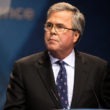MIKE HUCKABEE OFTEN MIXES RELIGION with politics. But the former Arkansas governor jumped the shark on the eve of the Michigan primary, when he told a crowd of cheering (and faithful) supporters that the Constitution needs a religious fix:
“I have opponents in this race,” he said, “who do not want to change the Constitution. But I believe it’s a lot easier to change the Constitution than it would be to change the word of the living God. And that’s what we need to do—to amend the Constitution so it’s in God’s standards rather than try to change God’s standards so it lines up with some contemporary view of how we treat each other and how we treat the family.”
Huckabee’s proposal to amend the Constitution in order to make it conform with the Bible didn’t get all the attention it deserved. Perhaps because it was jumbled in with a mix of other coverage of the six major candidates. Perhaps because metastasized evangelical belief has become acceptable political discourse. Certainly because the media let him get away with it. No serious candidate for the American presidency had ever taken such an extreme position regarding the separation of church and state. Rev. Huckabee is proposing a policy that would render meaningless the “separation clause” in the First Amendment to the Constitution.
Huckabee is an ordained minister. He has preached sermons to Baptist congregations during the primary campaign. His position on abortion and homosexual marriage are rooted in Christian scripture. He has claimed that “God . . . created a government structure.”
Huckabee is one of two Republican candidates still in the race who reject Darwin’s theory of evolution. “It is a theory of evolution, that’s why it’s called the theory of evolution,” he said on a PBS program in 2004 when he was governor of Arkansas—resorting to the canard that confuses the colloquial and scientific use of the word theory.
Huckabee’s defense of his pre-modern scientific position is now more nuanced; he told ABC News that biblical creationism should not be banned from public schools because banning “sounds like sort of censorship.” (In 1987, the Supreme Court banned the teaching of biblical creationism in the public schools.)
Now Huckabee becomes the first candidate since the Rev. Pat Robertson in 1988, and the first contending presidential candidate in the nation’s history to openly and unapologetically run as a theocrat. Yet it’s possible that there’s a worldly method to his religious madness, a method informed by polling data and George W. Bush’s unprecedented success uniting the evangelical vote.
The Pew Research Center’s analysis of the 2004 presidential election confirms the correlation between church attendance and voting. The most stunning figure Pew’s pollsters turned up is the 82.4 percent support that white evangelical voters who attend church at least once a week provided George W. Bush in 2004.
The “God Gap” persists, even if no candidate in the 2008 Republican primary owns the evangelical vote, as Bush did. Only 62.8 percent of the “weekly attending white evangelicals” told pollsters they would support a Republican candidate in the 2008 election, a figure that explains Huckabee’s going over the top on church and state to fight for that vote.
Huckabee’s religious hucksterism worked in Iowa, where the God Gap overcame the money gap Mitt Romney created by outspending Huckabee twenty to one. But as the campaign moved east, Huckabee’s numbers went south. He placed third in New Hampshire, with 11 percent, and third in Michigan, with 16 percent.
On his way to South Carolina, where Christian-right voters make up 53 percent of the Republican vote, Huckabee unveiled his plan to baptize the Constitution. Looking at the polls, it made sense. Unlike Iowa’s Christian-right believers, who voted two to one for Huckabee, South Carolina’s evangelicals were fragmented. In early polling, Fred Thompson had 19 percent of their vote; Rudy Giuliani, 18 percent; Mitt Romney, 17 percent; John McCain, 15 percent; and Huckabee, 12—although the faithful fell in behind McCain and Huckabee when they emerged as leaders.
Televangelist goofball Pat Robertson had endorsed Giuliani. Southern Baptist Theological Seminary president Al Mohler embraced Mitt Romney, and Bob Jones University president Bob Jones III endorsed him. Lacking the support of what his campaign calls “the generals,” Huckabee borrowed a page from George W. Bush’s 2000 playbook and began talking over the heads of the evangelical curia.
Bush won by going directly to the faithful. Bush did not, however, advocate writing the words of “a Living God” into the Constitution. In an effort to close the deal with evangelicals in South Carolina, Huckabee did, and they responded even if they couldn’t stop John McCain.
Writing on Harvard’s Neiman Foundation website, former White House reporter Saul Friedman concluded that political reporters fail to call unscientific, know-nothing nonsense by its right name because they fear they will offend believers. The media have treated Huckabee’s religious extremism with deference, even if a reporter’s right to raise those questions is guaranteed by the same First Amendment that provides for the separation of church and state.






0 Comments